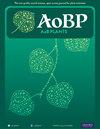腐植酸通过调节叶黄素和细胞分裂素生物合成途径改善小麦生长
IF 2.4
3区 生物学
Q2 ECOLOGY
引用次数: 0
摘要
几个世纪以来,腐植酸一直被广泛用于促进植物生长和提高生产力。腐植酸的有益作用归因于不同的功能基团和大结构中的植物激素类化合物。然而,人们对腐植酸促进植物生长的作用机制只有部分了解。我们推测腐植酸的生物刺激作用主要是由于调节了经处理植物的先天性辅助素和细胞分裂素生物合成途径。为了了解腐植酸的生物刺激作用机制,我们进行了生理学调查和分子鉴定。对小麦幼苗中参与植物生长素和细胞分裂素生物合成途径的基因进行了表达分析。此外,研究人员还利用拟南芥转基因品系,将辅助素响应型 DR5 和细胞分裂素响应型 ARR5 启动子与ß-葡萄糖醛酸酶(GUS)报告基因融合,对腐植酸处理过的幼苗进行了 GUS 表达分析。该研究表明,腐植酸处理能改善小麦幼苗的芽和根的生长。与对照组相比,腐植酸处理后的幼苗中参与植物生长素(拟南芥色氨酸氨基转移酶和 Gretchen Hagen 3.2)和细胞分裂素(Lonely Guy3)生物合成途径的多个基因表达上调。此外,GUS 表达分析表明,腐植酸的生物活性化合物能刺激内源辅素和细胞分裂素类活性。本研究是首次利用 ARR5 :GUS 株系证明腐植酸生物刺激素活性的报告。本文章由计算机程序翻译,如有差异,请以英文原文为准。
Humic Acid Improves Wheat Growth by Modulating Auxin and Cytokinin Biosynthesis Pathways
Humic acids have been widely used for centuries to enhance plant growth and productivity. The beneficial effects of humic acids have been attributed to different functional groups and phytohormone-like compounds enclosed in macrostructure. However, the mechanisms underlying the plant growth-promoting effects of humic acids are only partially understood. We hypothesize that the bio-stimulatory effect of humic acids is mainly due to the modulation of innate pathways of auxin and cytokinin biosynthesis in treated plants. A physiological investigation along with molecular characterization was carried out to understand the mechanism of bio-stimulatory effects of humic acid. A gene expression analysis was performed for the genes involved in auxin and cytokinin biosynthesis pathways in wheat seedlings. Furthermore, Arabidopsis thaliana transgenic lines generated by fusing the auxin-responsive DR5 and cytokinin-responsive ARR5 promoter to ß-glucuronidase (GUS) reporter were used to study the GUS expression analysis in humic acid treated seedlings. This study demonstrates that humic acid treatment improved the shoot and root growth of wheat seedlings. The expression of several genes involved in auxin (Tryptophan Aminotransferase of Arabidopsis and Gretchen Hagen 3.2) and cytokinin (Lonely Guy3) biosynthesis pathways was up-regulated in humic acid treated seedlings compared to the control. Furthermore, GUS expression analysis showed that bioactive compounds of humic acid stimulate endogenous auxin and cytokinin-like activities. This study is the first report in which using ARR5 :GUS lines we demonstrate the biostimulants activity of humic acid.
求助全文
通过发布文献求助,成功后即可免费获取论文全文。
去求助
来源期刊

AoB Plants
PLANT SCIENCES-
CiteScore
4.80
自引率
0.00%
发文量
54
审稿时长
20 weeks
期刊介绍:
AoB PLANTS is an open-access, online journal that has been publishing peer-reviewed articles since 2010, with an emphasis on all aspects of environmental and evolutionary plant biology. Published by Oxford University Press, this journal is dedicated to rapid publication of research articles, reviews, commentaries and short communications. The taxonomic scope of the journal spans the full gamut of vascular and non-vascular plants, as well as other taxa that impact these organisms. AoB PLANTS provides a fast-track pathway for publishing high-quality research in an open-access environment, where papers are available online to anyone, anywhere free of charge.
 求助内容:
求助内容: 应助结果提醒方式:
应助结果提醒方式:


